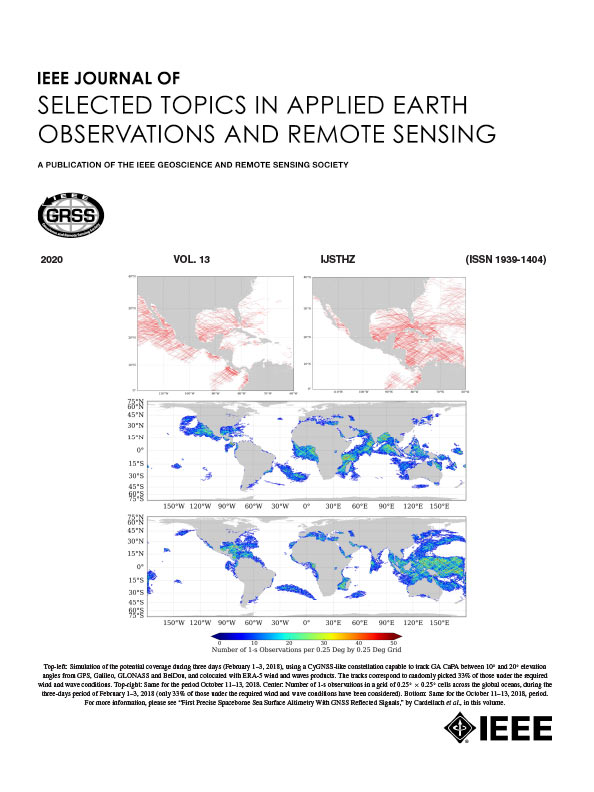DCDGAN-STF: A Multiscale Deformable Convolution Distillation GAN for Remote Sensing Image Spatiotemporal Fusion
IF 4.7
2区 地球科学
Q1 ENGINEERING, ELECTRICAL & ELECTRONIC
IEEE Journal of Selected Topics in Applied Earth Observations and Remote Sensing
Pub Date : 2024-10-07
DOI:10.1109/JSTARS.2024.3476153
引用次数: 0
Abstract
Remote sensing image spatiotemporal fusion (STF) aims to generate composite images with high-temporal and spatial resolutions by combining remote sensing images captured at different times and with different spatial resolutions (DTDS). Among the existing fusion algorithms, deep learning-based fusion models have demonstrated outstanding performance. These models treat STF as an image super-resolution problem based on multiple reference images. However, compared to traditional image super-resolution tasks, remote sensing image STF involves merging a larger amount of multitemporal data with greater resolution difference. To enhance the robust matching performance of spatiotemporal transformations between multiple sets of remote sensing images captured at DTDS and to generate super-resolution composite images, we propose a feature fusion network called the multiscale deformable convolution distillation generative adversarial network (DCDGAN-STF). Specifically, to address the differences in multitemporal data, we introduce a pyramid cascading deformable encoder to identify disparities in multitemporal images. In addition, to address the differences in spatial resolution, we propose a teacher–student correlation distillation method. This method uses the texture details' disparities between high-resolution multitemporal images to guide the extraction of disparities in blurred low-resolution multitemporal images. We comprehensively compared the proposed DCDGAN-STF with some state-of-the-art algorithms on two landsat and moderate-resolution imaging spectroradiometer datasets. Ablation experiments were also conducted to test the effectiveness of different submodules within DCDGAN-STF. The experimental results and ablation analysis demonstrate that our algorithm achieves superior performance compared to other algorithms.DCDGAN-STF:用于遥感图像时空融合的多尺度可变形卷积蒸馏 GAN
遥感图像时空融合(STF)旨在通过将不同时间、不同空间分辨率(DTDS)的遥感图像结合起来,生成具有高时间分辨率和空间分辨率的复合图像。在现有的融合算法中,基于深度学习的融合模型表现出色。这些模型将 STF 视为基于多个参考图像的图像超分辨率问题。然而,与传统的图像超分辨率任务相比,遥感图像 STF 涉及合并分辨率差异更大的大量多时数据。为了提高 DTDS 拍摄的多组遥感图像之间时空变换的鲁棒匹配性能,并生成超分辨率合成图像,我们提出了一种名为多尺度可变形卷积蒸馏生成对抗网络(DCDGAN-STF)的特征融合网络。具体来说,针对多时数据的差异,我们引入了金字塔级联可变形编码器来识别多时图像中的差异。此外,针对空间分辨率的差异,我们提出了一种师生相关蒸馏法。这种方法利用高分辨率多时图像之间的纹理细节差异来指导模糊的低分辨率多时图像的差异提取。我们在两个陆地卫星和中分辨率成像分光辐射计数据集上全面比较了所提出的 DCDGAN-STF 和一些最先进的算法。我们还进行了消融实验,以检验 DCDGAN-STF 中不同子模块的有效性。实验结果和消融分析表明,与其他算法相比,我们的算法性能更优。
本文章由计算机程序翻译,如有差异,请以英文原文为准。
求助全文
约1分钟内获得全文
求助全文
来源期刊
CiteScore
9.30
自引率
10.90%
发文量
563
审稿时长
4.7 months
期刊介绍:
The IEEE Journal of Selected Topics in Applied Earth Observations and Remote Sensing addresses the growing field of applications in Earth observations and remote sensing, and also provides a venue for the rapidly expanding special issues that are being sponsored by the IEEE Geosciences and Remote Sensing Society. The journal draws upon the experience of the highly successful “IEEE Transactions on Geoscience and Remote Sensing” and provide a complementary medium for the wide range of topics in applied earth observations. The ‘Applications’ areas encompasses the societal benefit areas of the Global Earth Observations Systems of Systems (GEOSS) program. Through deliberations over two years, ministers from 50 countries agreed to identify nine areas where Earth observation could positively impact the quality of life and health of their respective countries. Some of these are areas not traditionally addressed in the IEEE context. These include biodiversity, health and climate. Yet it is the skill sets of IEEE members, in areas such as observations, communications, computers, signal processing, standards and ocean engineering, that form the technical underpinnings of GEOSS. Thus, the Journal attracts a broad range of interests that serves both present members in new ways and expands the IEEE visibility into new areas.

 求助内容:
求助内容: 应助结果提醒方式:
应助结果提醒方式:


